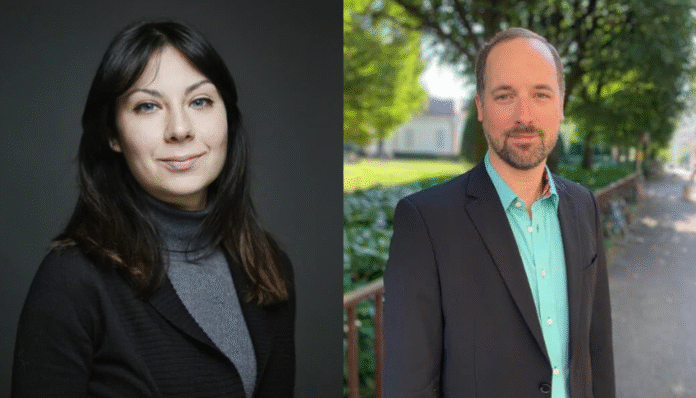Human rights defenders and lawyers in Turkey and elsewhere are facing mounting pressure and persecution while the Council of Europe (CoE) remains largely silent, according to two prominent European rights advocates.
In a strongly worded statement to Turkish Minute, Eleonora Mongelli, vice president of the Italian Federation for Human Rights, and Florian Irminger, president of the Geneva-based Progress & Change Action Lab, accused the CoE of failing to protect those who uphold its foundational values, democracy, human rights and the rule of law.
“After nearly two decades defending democracy and the rule of law across Europe, we have come to a painful conclusion: the Council of Europe has abandoned those who promote its very foundations,” the two wrote.
Crackdown in Turkey
The rights advocates pointed to Turkey’s escalating crackdown on lawyers since a failed coup in 2016 as an example of systemic repression. They cited the prosecution of more than 1,700 lawyers, with over 700 held in pretrial detention and at least 553 sentenced to a combined 3,300 years in prison, often solely for defending clients accused of terrorism.
The Turkish government, which launched a crackdown on non-loyalist citizens following the coup attempt under the pretext of an anti-coup fight, has been targeting lawyers for years, affiliating them with their clients accused of terrorism or coup-related charges, widely seen as politically motivated.
Among those targeted were 14 former provincial bar association chairmen. Four lawyers, including Ebru Timtik, have died in prison. Timtik died after a 238-day hunger strike in 2020 demanding a fair trial.
Timtik was sentenced in 2019 to more than 13 years in prison on conviction of “membership in a terrorist organization.”
However, rights advocates watching the case claimed she was being prosecuted for her actions as a lawyer.
Mongelli and Irminger said the repression in Turkey has extended to political figures and their legal representatives as they cited the arrest of İstanbul’s opposition mayor, Ekrem İmamoğlu, in March.
İmamoğlu, a key opposition figure and his main opposition Republican People’s Party’s (CHP) presidential candidate, was arrested on corruption charges widely seen as politically motivated. His lawyer, Mehmet Pehlivan, was also detained briefly on what critics say were fabricated charges.
“Despite these developments, the Council of Europe has offered only muted responses. The Secretary General’s most recent visit to Turkey included no public criticism, drawing further ire from human rights advocates,” Mongelli and Irminger said.
Erdoğan held a closed-door meeting in April with CoE Secretary General Alain Berset at the presidential palace in Ankara under the shadow of İmamoğlu’s arrest. Berset did not voice any public criticism about the mayor’s arrest.
Yet, in a statement on April 9, the CoE‘s Conference of International Non-Governmental Organisations called for the immediate release of the mayor and other detainees, denouncing the charges as politically motivated and raising concerns over the erosion of democratic norms in Turkey.
Silence on iconic cases
The CoE’S silence has extended to other member states, according to Mongelli and Irminger. In Azerbaijan, prominent human rights activist Anar Mammadli remains behind bars despite a 2018 European Court of Human Rights ruling declaring his earlier detention unlawful and politically motivated. He is scheduled to stand trial again in Baku on May 26.
The authors also mentioned the case of Intigam Aliyev, a lawyer who defended over 140 clients before the Strasbourg court, only to be jailed and disbarred. Azerbaijan ignored the court’s ruling in his favor, while the CoE is being accused of remaining passive.
Polish lawyer Sylwia Gregorczyk-Abram, known for defending judicial independence, has faced smear campaigns and threats. The CoE offered no public support. In Russia, before its expulsion in 2022, lawyers representing opposition figures were arrested or forced into exile with little pushback from the CoE, the authors said.
Calls for reform
Mongelli and Irminger urged the CoE to take immediate and concrete action. They called on the Committee of Ministers to use infringement proceedings against countries that ignore court judgments or target legal professionals. They also advocated for ratification and enforcement of the new Convention on the Protection of the Profession of Lawyer, unveiled this month in Luxembourg.
An emergency fund should be established for lawyers at risk, they said, particularly those working in exile. The secretary general should regularly invoke Article 52 of the European Convention on Human Rights to investigate systemic repression, and the council should publish an annual report naming countries that persecute human rights defenders.
“If defenders cannot count on Strasbourg, why should victims bring their cases?” they said.
The authors warned that without serious institutional reforms, the CoE risks becoming “an institution of wishful thinkers,” divorced from the realities faced by the very people it claims to protect.
“We know the Council of Europe can act. But for too long, it has chosen not to. And those who defend our rights are paying the price. It is not just the human rights defenders who are in danger — it is the institution itself and all of our human rights,” they said.
Mongelli is a long-time advocate for victims of political persecution. She specializes in human rights monitoring, international advocacy and countering disinformation, with a focus on regions such as Eastern Europe, Turkey, China and Iran. She is also the creator of the podcast “Made in Slavery” on the repression of Uyghurs in China.
Irminger has over 20 years of experience promoting fundamental freedoms and reforming international institutions. His work spans local government, political leadership and international NGOs, with a geographic focus that includes Europe, Central Asia and Africa.
Both serve on the steering committee of the Campaign to Uphold Rights in Europe.















